At the Department of Hemodialysis - Xuyen A General Hospital (HCMC), 30 patients lie quietly on beds, their bodies attached to dialysis machines with a tangle of tubes. The air is thick with the smell of antiseptic and the sound of machines running steadily to maintain the lives of patients with kidney failure.
A dialysis session lasts 4 hours, 3 times a week. Each time, dozens of liters of blood are withdrawn from the body, filtered through an artificial membrane, and returned. The body is exhausted, but no one is allowed to give up.
"Taking a day off is life-threatening," male patient PQT (23 years old, in Tay Ninh ) shared.
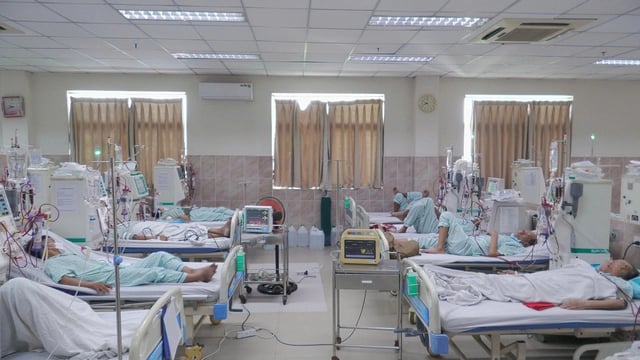
Hemodialysis is a method of filtering blood outside the body using a machine to treat end-stage renal failure.
PHOTO: LE CAM
The disease not only takes away health, but also suffocates the future and livelihood of many families. Some people have to quit their jobs while being the breadwinner of their families, some have to drop out of school, some live on borrowed money...
According to the Vietnam Association of Young Physicians, in Vietnam, it is estimated that up to 8.7 million adults are living with this disease, equivalent to nearly 12.8% of the adult population. In-depth reports from domestic medical facilities in the period 2020-2025, the rate of young people aged 18 to 30 with kidney disease accounts for 20-30% of the total number of kidney disease cases. The main cause comes from unscientific lifestyles such as staying up late for a long time, drinking a lot of soft drinks, eating salty foods, stress, lack of exercise...
12 hour night shift and 3 bottles of soft drinks per day
PQT - a 23-year-old man from Tay Ninh never thought he would sit down and write his life diary from a dialysis bed. His night shift security job kept him awake for 12 hours straight, often eating instant noodles and drinking soft drinks instead of water.
"3 bottles of soft drinks every day, like a daily meal, for 2 years before I discovered the disease," T. recounted.
In October 2024, T.'s face and limbs suddenly became swollen. "At that time, I thought it was probably due to lack of sleep. Unexpectedly, the doctor said I had stage 3 chronic kidney disease. I felt extremely surprised and sad," T. expressed.
Since then, T. has been on dialysis for 3 days a week, 4 hours each time. She quit her job, stayed home, and relied on her family. "The hardest thing is seeing my parents struggling to pay the bills. And I can't help with anything," T. shared.
However, T. did not give up and hoped that one day he would get well again. He gave up soft drinks, limited his salty diet, and learned a different way of life. "I want to get well again to go to work and help my family. I'm still young," T. confided.
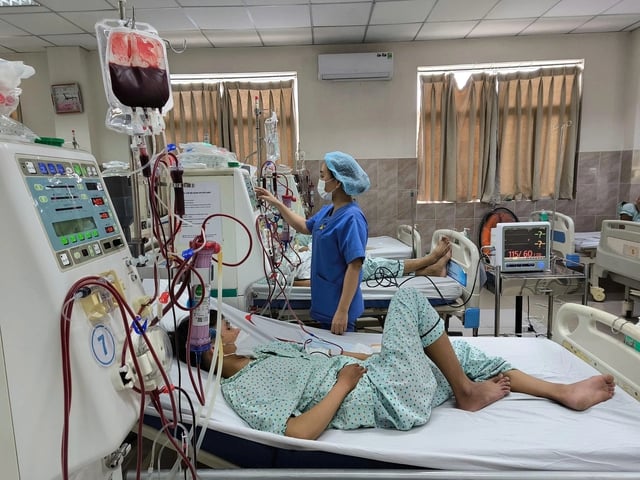
PQT during dialysis
PHOTO: LE CAM
At 27, he crossed the line between life and death thanks to his mother's kidney.
If PQT is fighting every day with chronic kidney disease, TTNT (27 years old, in Cu Chi) has entered a new chapter, starting life over after a kidney transplant.
In June 2024, she fainted while working. That was the first time NT knew she had end-stage renal failure. "Before that, I had body aches, swollen legs, insomnia, and difficulty breathing. But I thought it was probably due to stress," NT said.
The habit of staying up late to study, drinking soft drinks like water, and eating late at night continuously, all of which NT has maintained since his student days.
"My body could handle it so I was subjective. When I found out I had the disease, I only had two options: lifelong dialysis or a kidney transplant," NT shared.
A year later, the mother quietly made the biggest decision of her life: donating her kidney so that her daughter could live. On the day of surgery, NT felt both happy and guilty. Because her life now lay in her mother's body.
The transplant was successful. NT returned home with a new kidney and a completely different perception of his body, health and future.
The story of PTQ and TTNT is not an isolated one. Doctors warn that kidney disease is getting younger and younger. The reason comes from the reasons that many young people still reassure themselves "it's probably okay" such as sleeping late, drinking soft drinks, abusing processed foods, and being lazy.
Kidney disease often progresses silently, and by the time it is detected, it is already in a late stage, requiring dialysis or a kidney transplant. For young people, it is not only a physical shock but also a hanging sentence for all dreams of career, family and future. (To be continued)
Source: https://thanhnien.vn/suy-than-rinh-rap-nguoi-tre-su-song-gan-voi-may-loc-mau-o-tuoi-23-185250623233115862.htm





![[Photo] Prime Minister Pham Minh Chinh chairs the conference to review the 2024-2025 school year and deploy tasks for the 2025-2026 school year.](https://vphoto.vietnam.vn/thumb/1200x675/vietnam/resource/IMAGE/2025/8/22/2ca5ed79ce6a46a1ac7706a42cefafae)

![[Photo] President Luong Cuong receives delegation of the Youth Committee of the Liberal Democratic Party of Japan](https://vphoto.vietnam.vn/thumb/1200x675/vietnam/resource/IMAGE/2025/8/22/2632d7f5cf4f4a8e90ce5f5e1989194a)







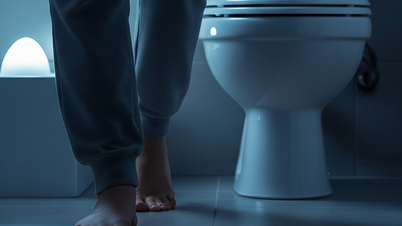




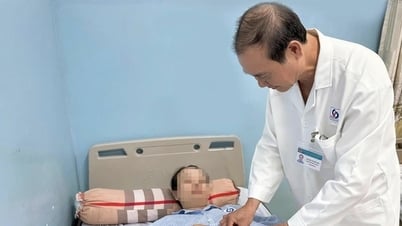



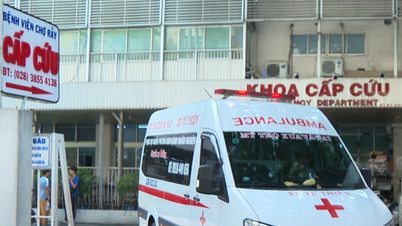










































































Comment (0)